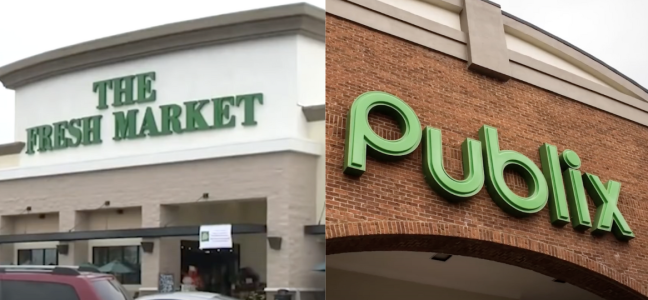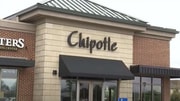Stop overpaying for groceries! Find out which stores might be costing you more
By
Veronica E.
- Replies 5
Grocery prices have been climbing, and if you’re feeling like your usual shopping bill is higher than ever, you’re not alone.
Many Americans—especially seniors on a fixed income—are looking for ways to make their budgets go further without sacrificing quality.
One of the simplest ways to save? Being mindful of where you shop.
Not all grocery stores price their essentials the same way, and some can charge noticeably more for everyday items like milk, eggs, and bread.
While certain stores might offer a premium shopping experience, it doesn’t always mean better value.

If you’re looking to keep your grocery bill in check, it’s worth knowing which stores may be more expensive for staple items.
We’ve compared the prices of six common grocery essentials—ground beef, chicken breast, eggs, milk, tomatoes, and whole wheat bread—across different supermarket chains.
If saving money is a priority, here are some stores where you may want to be more selective with your purchases.
The Fresh Market, with its European-style market ambiance, may offer a delightful shopping experience, but it’s not the place to find the best deals on pantry essentials.
Our research shows that all the staple items we compared were priced above average.
For instance, a gallon of fortified whole milk cost more than twice the average price, and organic meats were significantly more expensive.
If you're shopping on a budget, The Fresh Market may not be the best choice for your regular grocery haul.
Publix, a large supermarket chain in the southeastern United States, claims to focus on customer value, but the numbers tell a different story.
While there are occasional below-average prices, most of the essential items we checked were more expensive than the national average.
Meats and eggs, in particular, were costly—even after factoring in delivery and pickup charges.
Publix may offer convenience and a wide selection, but for those looking to save, it might not be the wisest option.

Whole Foods Market, known for its commitment to natural and organic foods, has a reputation for being pricey—and our findings support this.
While there are some deals, such as reasonably priced whole wheat bread from their 365 brand, the majority of their staples come with a higher price tag due to their organic focus.
Whole Foods may be a great option for those prioritizing organic produce, but for budget-conscious shoppers, it’s worth considering alternatives.
Acme Markets, part of the Albertsons family, is another store where shoppers will find most groceries priced above average.
The only exception we found was their whole wheat bread, which was reasonably priced.
However, for most essentials, Acme Markets isn’t the ideal destination for those watching their spending.
Rosauers Supermarkets, which brands itself as a natural market, offers prices that reflect its focus on "earth-friendly, natural, organic, and healthy" products.
While you might find a good deal on whole wheat bread and tomatoes, the cost of meat and dairy products could take a significant chunk out of your budget.
Rosauers may not be the most budget-friendly option for residents in the western states where it operates.
Natural Grocers, a health-focused supermarket, promotes affordable wellness—but that doesn’t necessarily extend to groceries.
With a selection of 100% organic, GMO-free produce, pasture-based dairy, and antibiotic- and hormone-free meats, prices are among the highest we've seen.
If you're looking for the most economical grocery shopping, Natural Grocers might not be your best bet.

Giant Eagle, a family-owned supermarket chain, may not have the natural or health-focused branding of some other stores, but it doesn’t offer the best prices either.
With most staples priced above average, budget shoppers may want to think twice before filling their carts here.
Gelson’s Markets, catering to the "discerning" customer, is another store where high-quality products and exceptional service come with a hefty price tag.
Essentials like eggs, milk, and meat are significantly more expensive than average, making Gelson’s a less-than-ideal choice for those looking to save.
H-E-B Fresh Foods, a Texas-based grocery chain, is a mixed bag when it comes to pricing.
While some items like milk and whole wheat bread are below average, others—such as eggs and chicken breast—are nearly double the national average.
Shoppers at H-E-B will need to be selective to avoid overspending.
Sprouts Farmers Market, despite its emphasis on fresh and organic foods, offers a few items at below-average prices.
However, the cost of milk and meat is on the higher side, meaning overall savings might be minimal.
Erewhon, a Los Angeles-based premium grocery retailer, is notorious for its sky-high prices.
With items like pasture-raised eggs and organic meats costing nearly twice the national average, Erewhon epitomizes luxury grocery shopping—making it a less practical option for those on a budget.
So, where can you shop for quality groceries at a better price?
Many budget-conscious shoppers turn to stores like ALDI and Costco, which have built a strong reputation for offering affordable staples without compromising on quality.
The key to saving on groceries isn’t just about avoiding the most expensive stores—it’s about being intentional with where and how you shop.
Look out for weekly specials, use loyalty programs, and compare prices across different supermarkets to get the most value for your money.
Read next: Troubling signs out West—Could your water supply be at risk? Two lakes remain dangerously low at just 35% full.

What do you think? Have you noticed certain grocery stores charging more for the same items? Do you have a go-to supermarket for getting the best deals? Share your thoughts in the comments!
Many Americans—especially seniors on a fixed income—are looking for ways to make their budgets go further without sacrificing quality.
One of the simplest ways to save? Being mindful of where you shop.
Not all grocery stores price their essentials the same way, and some can charge noticeably more for everyday items like milk, eggs, and bread.
While certain stores might offer a premium shopping experience, it doesn’t always mean better value.

Smart shopping starts with knowing where to go—are you paying more than you should for your groceries? Image Source: Pexels / Gustavo Fring.
If you’re looking to keep your grocery bill in check, it’s worth knowing which stores may be more expensive for staple items.
We’ve compared the prices of six common grocery essentials—ground beef, chicken breast, eggs, milk, tomatoes, and whole wheat bread—across different supermarket chains.
If saving money is a priority, here are some stores where you may want to be more selective with your purchases.
The Fresh Market
The Fresh Market, with its European-style market ambiance, may offer a delightful shopping experience, but it’s not the place to find the best deals on pantry essentials.
Our research shows that all the staple items we compared were priced above average.
For instance, a gallon of fortified whole milk cost more than twice the average price, and organic meats were significantly more expensive.
If you're shopping on a budget, The Fresh Market may not be the best choice for your regular grocery haul.
Publix
Publix, a large supermarket chain in the southeastern United States, claims to focus on customer value, but the numbers tell a different story.
While there are occasional below-average prices, most of the essential items we checked were more expensive than the national average.
Meats and eggs, in particular, were costly—even after factoring in delivery and pickup charges.
Publix may offer convenience and a wide selection, but for those looking to save, it might not be the wisest option.

The Fresh Market (left) offers a premium shopping experience, while Publix (right) provides convenience—but are their prices worth it for budget-conscious shoppers? Image Source: YouTube / Mashed and Company Man.
Also read: Stop wasting money today: The grocery items that are draining your wallet revealed!
Whole Foods
Whole Foods Market, known for its commitment to natural and organic foods, has a reputation for being pricey—and our findings support this.
While there are some deals, such as reasonably priced whole wheat bread from their 365 brand, the majority of their staples come with a higher price tag due to their organic focus.
Whole Foods may be a great option for those prioritizing organic produce, but for budget-conscious shoppers, it’s worth considering alternatives.
Acme Markets
Acme Markets, part of the Albertsons family, is another store where shoppers will find most groceries priced above average.
The only exception we found was their whole wheat bread, which was reasonably priced.
However, for most essentials, Acme Markets isn’t the ideal destination for those watching their spending.
Also read: Popular grocery chain closing budget stores–Is your favorite one next?
Rosauers
Rosauers Supermarkets, which brands itself as a natural market, offers prices that reflect its focus on "earth-friendly, natural, organic, and healthy" products.
While you might find a good deal on whole wheat bread and tomatoes, the cost of meat and dairy products could take a significant chunk out of your budget.
Rosauers may not be the most budget-friendly option for residents in the western states where it operates.
Natural Grocers
Natural Grocers, a health-focused supermarket, promotes affordable wellness—but that doesn’t necessarily extend to groceries.
With a selection of 100% organic, GMO-free produce, pasture-based dairy, and antibiotic- and hormone-free meats, prices are among the highest we've seen.
If you're looking for the most economical grocery shopping, Natural Grocers might not be your best bet.

Rosauers (left) and Natural Grocers (right) offer specialty products, but their higher prices might not be ideal for those looking to save on groceries. Image Source: YouTube / ClarkCountyToday and Mattreviews.
Also read: Popeyes is bringing its flavor to grocery stores—but it’s not what you think
Giant Eagle
Giant Eagle, a family-owned supermarket chain, may not have the natural or health-focused branding of some other stores, but it doesn’t offer the best prices either.
With most staples priced above average, budget shoppers may want to think twice before filling their carts here.
Gelson’s
Gelson’s Markets, catering to the "discerning" customer, is another store where high-quality products and exceptional service come with a hefty price tag.
Essentials like eggs, milk, and meat are significantly more expensive than average, making Gelson’s a less-than-ideal choice for those looking to save.
Also read: Revealed: The states where your grocery bill could skyrocket–And where you can save big!
H-E-B
H-E-B Fresh Foods, a Texas-based grocery chain, is a mixed bag when it comes to pricing.
While some items like milk and whole wheat bread are below average, others—such as eggs and chicken breast—are nearly double the national average.
Shoppers at H-E-B will need to be selective to avoid overspending.
Sprouts
Sprouts Farmers Market, despite its emphasis on fresh and organic foods, offers a few items at below-average prices.
However, the cost of milk and meat is on the higher side, meaning overall savings might be minimal.
Erewhon
Erewhon, a Los Angeles-based premium grocery retailer, is notorious for its sky-high prices.
With items like pasture-raised eggs and organic meats costing nearly twice the national average, Erewhon epitomizes luxury grocery shopping—making it a less practical option for those on a budget.
So, where can you shop for quality groceries at a better price?
Many budget-conscious shoppers turn to stores like ALDI and Costco, which have built a strong reputation for offering affordable staples without compromising on quality.
The key to saving on groceries isn’t just about avoiding the most expensive stores—it’s about being intentional with where and how you shop.
Look out for weekly specials, use loyalty programs, and compare prices across different supermarkets to get the most value for your money.
Read next: Troubling signs out West—Could your water supply be at risk? Two lakes remain dangerously low at just 35% full.
Key Takeaways
- Grocery prices are on the rise, and finding a store with the lowest overall prices is key to saving on weekly shopping bills.
- The cost of grocery staples such as ground beef, chicken breast, eggs, milk, tomatoes, and whole wheat bread varies significantly across different US supermarket chains.
- Upscale and specialty grocery stores such as The Fresh Market, Whole Foods, and Erewhon typically offer higher prices on everyday items when compared to the national average.
- Budget-conscious shoppers should compare prices and avoid certain grocery chains that consistently price their staples above the national average to make the most of their grocery budgets.
What do you think? Have you noticed certain grocery stores charging more for the same items? Do you have a go-to supermarket for getting the best deals? Share your thoughts in the comments!






